一、项目简介
本项目使用编程语言Python3.8,anaconda,开发工具pycharm,数据库MySQL5.7。
技术应用:开源计算机视觉库opencv-python,开源人脸识别库face_recognition,使用PyQt5制作人脸识别以及考勤界面,dlib人脸检测技术,以及MySQLdb连接数据库。
功能介绍:
第一步:录入,进入录入界面。调用摄像头检测识别人脸、输入姓名学号,人脸照片保存在faces文件夹中,姓名学号保存在数据库中。
第二步:考勤,进入考勤界面。调用摄像头进行人脸识别,摄像头识别出人脸和人脸对应的名字。
二、功能展示
1.人脸识别功能测试
这是从网上随便找了一张图片识别静态人脸,成功。
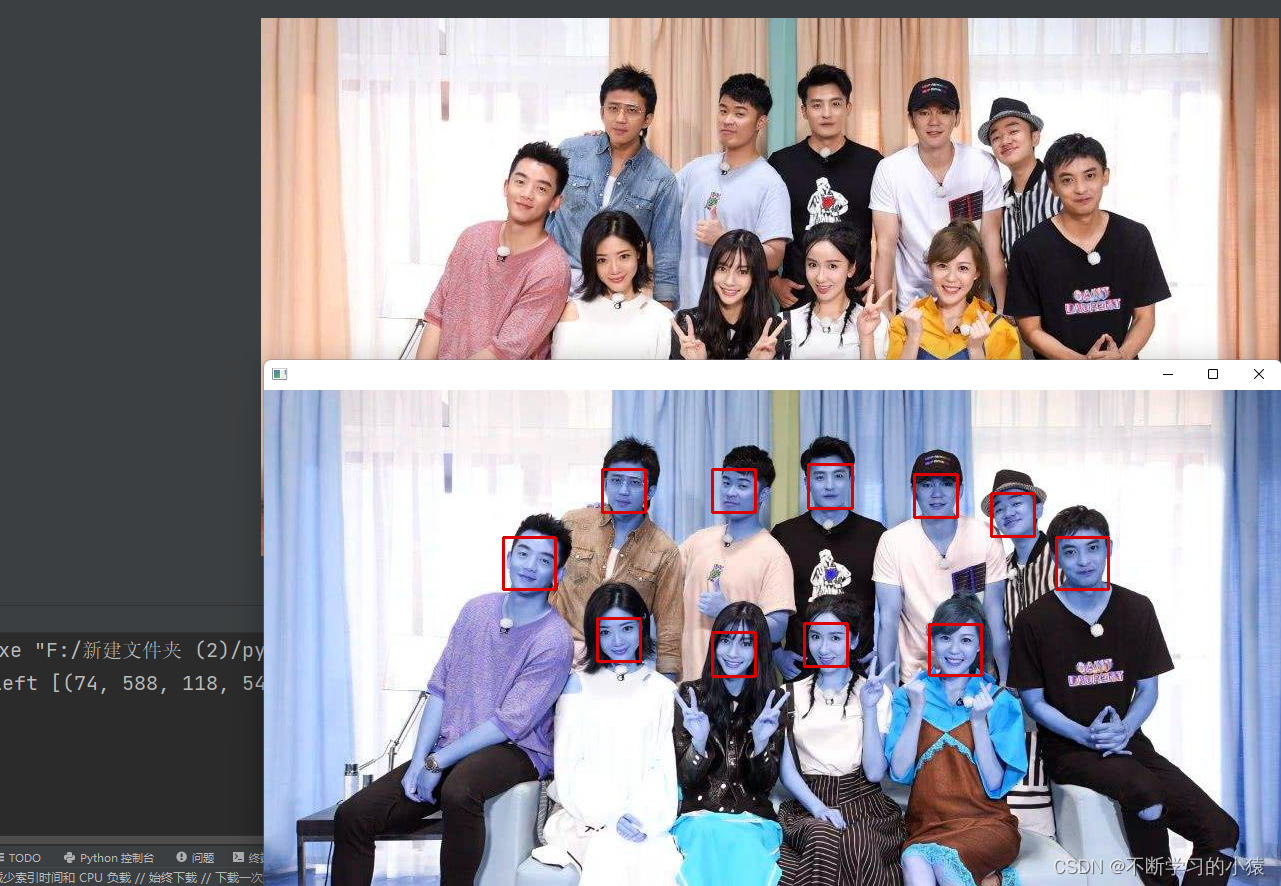
调用摄像头识别动态人脸,成功
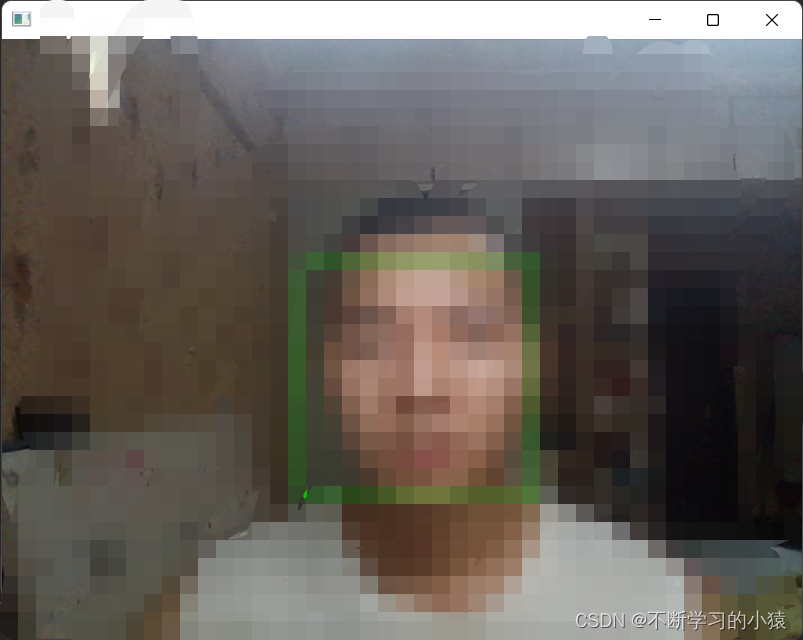
上述功能代码如下:
def a1():
#加载图片
img=face_recognition.load_image_file("1.jpeg")
#检测脸部位置
pos=face_recognition.face_locations(img)
print("位置top,right,bottom,left",pos)
for i in range(len(pos)):
rect=pos[i]
#绘制矩形
cv2.rectangle(img,(rect[3],rect[0]),(rect[1],rect[2]),(0,0,220),2)
#显示窗口
cv2.imshow("",img)
cv2.waitKey(0)
def a2():
vd=cv2.VideoCapture(0)
while True:
#读取摄像头数据流
ok,frame=vd.read()
#矩阵子集
facearea=frame[:,:,::-1]
pos=face_recognition.face_locations(facearea)
for(top,right,bottom,left) in pos:
cv2.rectangle(frame,(left,top),(right,bottom),(0,200,0),2)
cv2.imshow("",frame)
cv2.waitKey(1)
vd.release()
cv2.destroyAllWindows()
2.识别并录入人脸及个人信息
此时人脸已经录入faces文件中,点击确定即可填写个人信息。
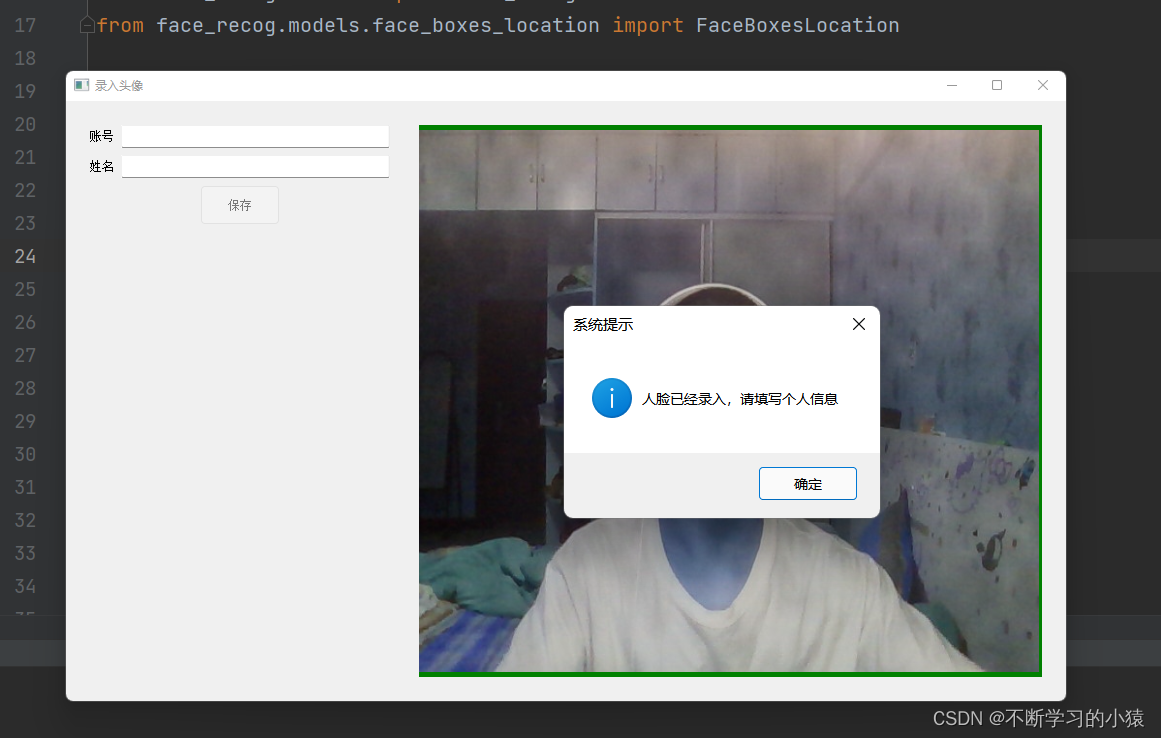
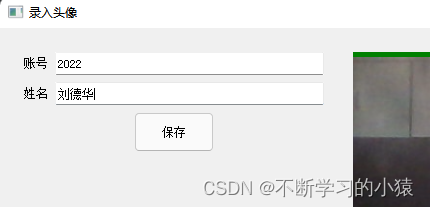 填写好信息,点击保存,信息即保存到数据库。
填写好信息,点击保存,信息即保存到数据库。
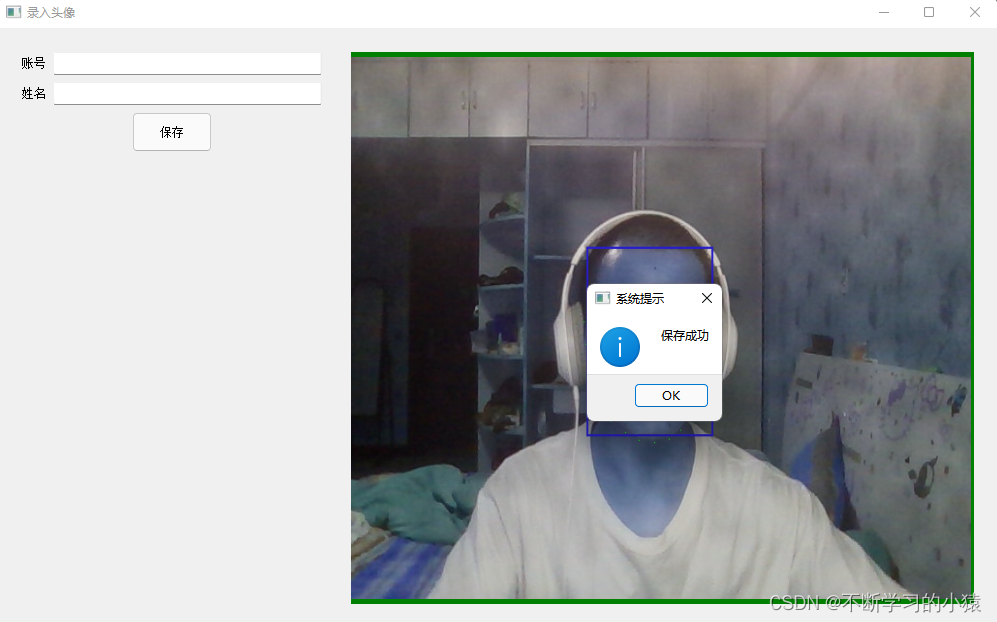
此时刚刚输入的账号和姓名已经保存到faces文件中,如下
 (挡住了一点,但是能看到)
(挡住了一点,但是能看到)
功能代码如下:
class LuruApp(UI_FaceRec):
def __init__(self):
super().__init__()
self.running = True
self.btn.setEnabled(False)
self.face_encode = None
self.open()
self.face_img = None
self.face_img_encode = ""
def open(self):
frame = np.zeros((500, 600, 3), np.uint8)
img = Image.fromarray(cv2.cvtColor(frame, cv2.COLOR_BGR2RGB))
draw = ImageDraw.Draw(img)
font = ImageFont.truetype("simkai.ttf", 40, encoding="utf-8")
draw.text((200, 200), "请正视摄像头", (200, 30, 40), font=font)
frame = cv2.cvtColor(np.asarray(img), cv2.COLOR_BGR2RGB)
frame = cv2.resize(frame, (self.img.width() - 10, self.img.height() - 10))
h, w1, d = frame.shape
# 从内存创建图像
frame = QImage(frame.data, w1, h, w1 * d, QImage.Format_RGB888)
self.img.setPixmap(QPixmap.fromImage(frame))
# 开启子线程
self.thread = Thread(target=self.doLuru)
self.thread.start()
def doLuru(self):
fbl = FaceBoxesLocation()
msg = ""
self.cap = cv2.VideoCapture(0)
# if self.cap.isOpened():
# ok, frame = self.cap.read()
while self.running:
ok, frame = self.cap.read()
frame = cv2.flip(frame, 1)
rawFrame = frame.copy()
# 脸部区域
face_pos = fbl.face_location(frame).astype(int)
if len(face_pos) == 0:
msg = "没有人脸"
elif len(face_pos) > 1:
msg = "请一个一个来!"
else:
msg = ""
face_mark = face_recog.face_landmarks(frame, face_pos)
# 脸部特征
new_face_encode = face_recog.face_encodings(frame, face_pos)[0]
if self.face_encode is None:
self.face_encode = new_face_encode
x1, y1, x2, y2 = face_pos[0]
self.face_img = frame[y1:y2, x1:x2]
print(self.face_img)
self.face_img_encode = self.face_encode.tolist()
# else:
# face_distance = face_recog.face_distance(self.face_encode[np.newaxis], new_face_encode)[0]
# if face_distance < 0.5:
# x1, y1, x2, y2 = face_pos[0]
# self.face_img = frame[y1:y2, x1:x2]
# print(self.face_img)
# self.face_img_encode = self.face_encode.tolist()
img = Image.fromarray(cv2.cvtColor(rawFrame, cv2.COLOR_BGR2RGB))
draw = ImageDraw.Draw(img)
for x1, y1, x2, y2 in face_pos:
draw.rectangle([(x1, y1), (x2, y2)], outline=(200, 30, 40), width=2)
# 绘制五官
if face_mark is not None:
for x, y in face_mark[0]:
draw.point((x, y), (20, 250, 25))
font = ImageFont.truetype("simkai.ttf", 40, encoding="utf-8")
draw.text((200, 200), msg, (200, 30, 40), font=font)
frame = cv2.cvtColor(np.asarray(img), cv2.COLOR_BGR2RGB)
frame = cv2.resize(frame, (self.img.width() - 10, self.img.height() - 10))
h, w1, d = frame.shape
# 从内存创建图像
frame = QImage(frame.data, w1, h, w1 * d, QImage.Format_RGB888)
self.img.setPixmap(QPixmap.fromImage(frame))
self.running = False
root = tkinter.Tk()
root.withdraw()
tkinter.messagebox.showinfo('系统提示', '人脸已经录入,请填写个人信息')
self.btn.setEnabled(True)
self.cap.release()
3.数据库保存信息
我使用的数据库可视化工具是Navicat12 for MySQL(也可以不用,mysql基本命令知道的话直接管理员cmd也可)
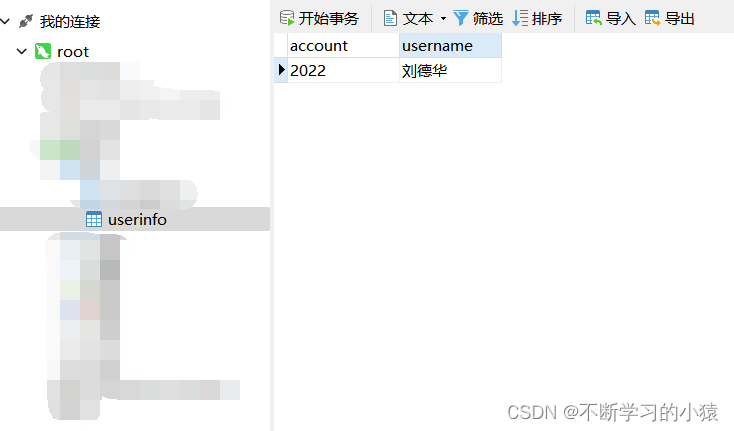
4.考勤打卡
运行如下,此时摄像头一直在运行,绿色框框始终识别你的人脸(跟随你移动)
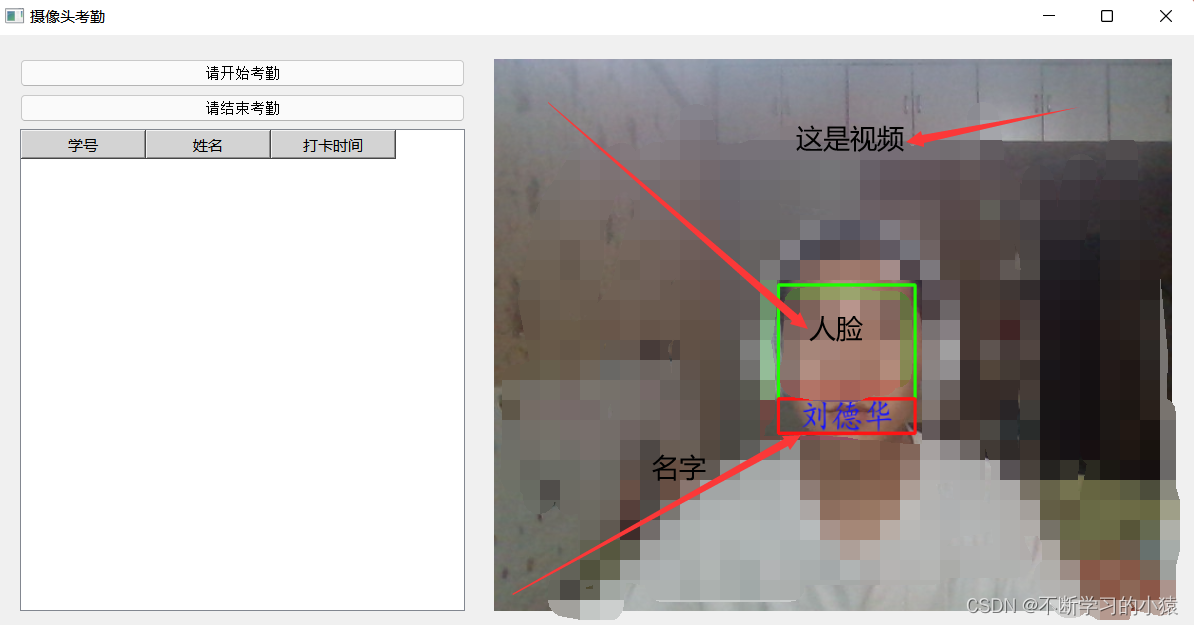
点击“请开始考勤”,开始考勤时间会直接显示在界面上

点击“请结束考勤”,结束考勤时间会存入数据库
功能代码如下:
class AttendanceApp(UI_FaceAttend):
def __init__(self):
super().__init__()
# 摄像头开启开关
self.running = True
self.startattend = False
# 摄像头看到的人的名字
self.vnames = []
# 存储学号+姓名+打卡时间
self.ats = []
self.open()
# 打开摄像头
def open(self):
frame = np.zeros((500, 600, 3), np.uint8)
# 灰化
img = Image.fromarray(cv2.cvtColor(frame, cv2.COLOR_BGR2RGB))
draw = ImageDraw.Draw(img)
font = ImageFont.truetype("simkai.ttf", 40, encoding="utf-8")
draw.text((200, 200), "准备考勤...", (200, 30, 40), font=font)
frame = cv2.cvtColor(np.asarray(img), cv2.COLOR_BGR2RGB)
# 调整图像大小
frame = cv2.resize(frame, (self.video.width(), self.video.height()))
h, w, d = frame.shape
# 从内存创建图像
frame = QImage(frame.data, w, h, w * d, QImage.Format_RGB888)
self.video.setPixmap(QPixmap.fromImage(frame))
# # 开启子线程
self.thread = Thread(target=self.doAttend)
self.thread.start()
def doAttend(self):
# 已录入的头像
luruimgs = []
# 头像对应人员
lurunames = []
path = "..\\faces"
# 遍历目录下的所有文件,得到所有文件名字
for root, dirs, files in os.walk(path):
for file in files:
filename = os.path.join(root, file)
if file.endswith("jpg"):
kimg = face_recognition.load_image_file(filename)
# 把图像转为矩阵
kimg_encoding = face_recognition.face_encodings(kimg)
if len(kimg_encoding) > 0:
firstencoder = kimg_encoding[0]
luruimgs.append(firstencoder)
name = file.split(".")[0]
xuehao = filename.split("\\")[-2]
# 格式:学号,姓名
lurunames.append(xuehao + "," + name)
# print("--",lurunames)
self.vcap = cv2.VideoCapture(0)
while self.running:
ok, frame = self.vcap.read()
rgbimg = frame[:, :, ::-1]
# 检测人脸
v_face_pos = face_recognition.face_locations(rgbimg)
# 人脸编码生成矩阵
v_face_encoding = face_recognition.face_encodings(rgbimg, v_face_pos)
for face in v_face_encoding:
# 比较摄像头人脸和已录入的人脸
matcher = face_recognition.compare_faces(luruimgs, face, 0.6)
# 距离
face_dist = face_recognition.face_distance(luruimgs, face)
# 取出最短距离
small = np.argmin(face_dist)
if matcher[small]:
facename = lurunames[small]
# 避免重复添加
if facename not in self.vnames:
self.vnames.append(facename)
self.ats.append(facename + "," + str(datetime.now()))
# print(facename)
# 合并数组
templist = zip(v_face_pos, self.vnames)
# 把摄像头看到的所有人的名字显示在图像区
for (top, right, bottom, left), name in templist:
cv2.rectangle(frame, (left, top), (right, bottom), (0, 255, 30), 2)
cv2.rectangle(frame, (left, bottom - 30), (right, bottom), (20, 20, 255), 2)
img = Image.fromarray(cv2.cvtColor(frame, cv2.COLOR_BGR2RGB))
draw = ImageDraw.Draw(img)
font = ImageFont.truetype("simkai.ttf", 30, encoding="utf-8")
# 显示人名
draw.text((left + 20, bottom - 30), name.split(",")[1], (20, 20, 255), font=font)
frame = cv2.cvtColor(np.asarray(img), cv2.COLOR_BGR2RGB)
self.showHead(frame)
# 点击开始打卡按钮
if self.startattend:
self.fillData()
self.vcap.release()
三、环境安装实例
Anaconda!真的好用!
1.下载python对应版本的dlib
你想要的dlib版本这里都有
然后pip install dlib -........whl(install后面为你下载的dlib的文件名)
pip install Cmake
2.安装opencv-python
pip install opencv-python
3.安装face_recognition
pip install face_recognition
4.安装pyqt5
pip install pyqt5
5.安装mysqlclient
pip install mysqlclient
四、需要源码私信并call邮箱lij867967@gmail.com
至此,结束!
小猿写的第一篇博客,写的不好还请担待
版权归原作者 不断学习的小猿 所有, 如有侵权,请联系我们删除。